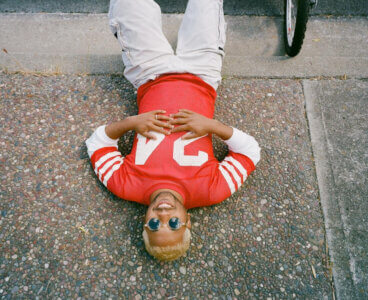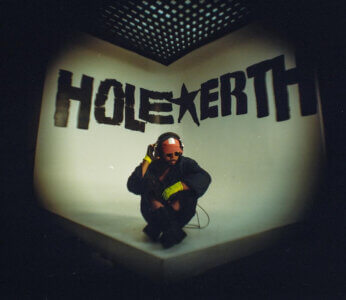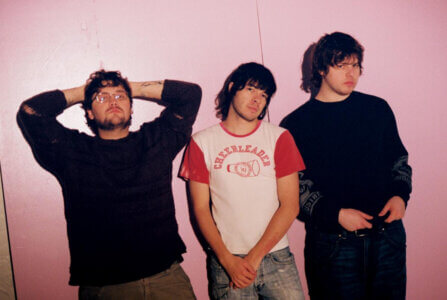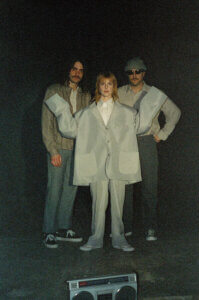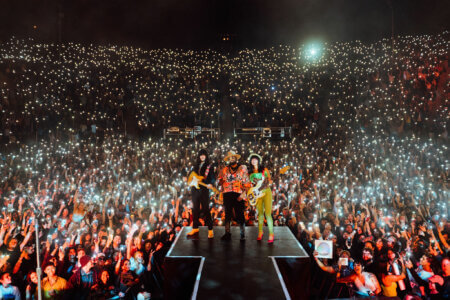Vinyl Williams
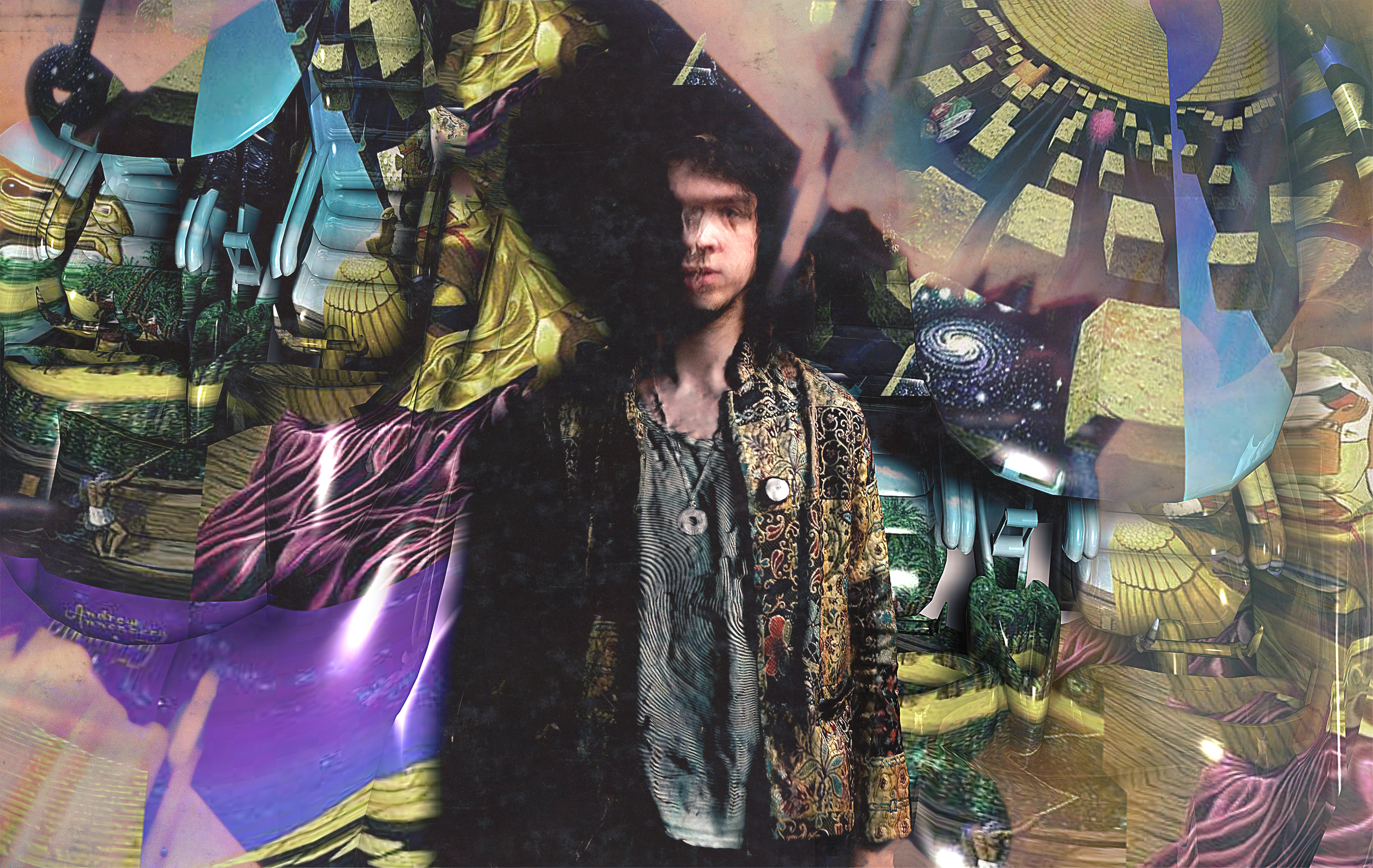
Multi-instrumentalist Lionel Williams (Vinyl Williams, as he prefers) has been using his new moniker to release his music and extravagant visual art projects. Unlike his grandfather who scored many timeless films, Vinyl prefers to blend elements of new wave, shoegaze, electro, psych-rock and mainstream pop into his distinctive sound. Vinyl has recently been signed to Chaz Bundick’s (Toro Y Moi, Les Sins) Company Records, where he is set to release his sophomore record Into on July 24. I spoke to Lionel while on the road about his forthcoming release and his creative outlets.
Northern Transmissions: First off, I just wanted to say congratulations in advance on your Into LP. You’re out on tour right now with Unknown Mortal Orchestra?
Lionel: We’re just about to leave on the tour. I believe we’re leaving Tuesday and the first show is a week from today.
NT: I was hoping to start off by getting to know what it was like growing up in Utah. I know you’ve mentioned that there was some religious and cultural dissonance, and how you first got into music as well.
L: Yeah I mean, I got into music when I was zero years old because I just grew up around musicians and I grew up in a studio. My dad had a little treehouse recording studio in the back of our Sherman Oaks house, and I was always around music, so that’s basically just how I got into music.
I moved to Utah when I was eight, in 1998, and immediately figured out that there’s an extremely cultural difference happening there. I had a Jewish upbringing, a reform Jewish upbringing and the first day of school in Utah I got a concussion because this child said “Jesus Christ is my Lord and saviour”. I said “who is that?”, because I’d never heard of Jesus, and during recess he actually jumped on my head with cleat boots and I almost died [laughs]. Symbolically, that began my fight for religious and musical harmony. Even before that, I sort of negated being a musician because it was always around me. You know, when you have something throughout your entire life, you always think it’s going to be there and you don’t put too much effort towards it. After that experience it slowly started to sink into my mind that I had a role to play on this earth. It was perfectly reactionary against that initial experience on my first day at school, and it unfolded from there. In that school district it was in a Swiss Mormon Village in Utah, which is almost completely opposite from the valley and Los Angeles where I grew up before. I mean, it just takes a little bit of shaking up and maybe even a little bit of suffering to begin an art practice. I’m very thankful that I went through that, to become more of an interesting human being that can culturally harmonize or at least attempt to provide blissful plateaus of experience, that can work and cooperate with people’s work ethic. That’s sort of what I want to do, ultimately, is just cooperate with whatever people are doing. But I feel like without the experiences in Utah I would just maybe approach things more ambiguously, and if I was a musician I would have done it without real set intentions. I feel like the intention is incredibly important and something that is good for humanity in general. I guess that’s an entrance to that topic.
NT: It’s almost like a blessing in disguise.
L: Yeah absolutely. Every conflict I’ve ever had – even now when conflicts happen in the moment, I’m so aware of the previous conflicts that have shaped who I am that I just accept it and let it flow through. It just works out. Like right now, I’m making a living by doing freelance music videos for a bunch of different bands and artists and I’m just barely breaking even every month. Sometimes my roommates get mad at me. I live with ten people in a warehouse venue in Los Angeles and we all rely on each other to stay there and support each other and make rent. Sometimes I pay late and that’s a serious conflict. I have to pull through by staying true and not compromising what I do, and it always ends up working out.
NT: You’ve directed videos for Unknown Mortal Orchestra and Tears for Fears. How was that experience? Was it difficult to incorporate your vision with their sound?
L: Not at all, it was actually – specifically with the Tears for Fears video and the Unknown Mortal Orchestra video I had complete 100% artistic freedom on the videos and more particularly with the Tears for Fears video. It was pretty much my first video I did that wasn’t for my own purpose, so it was real experimental for me to have to do that and also have to do it in a week. It was insanely stressful because it was the last week of school at Cal Arts where I studied. The last week of the last semester of my final. I was studying fine arts, which is not a difficult degree at all but still: the last week is insanely difficult to get everything in, get everything finalized. It was insane, it was the craziest week of my life but I got it done and I learned how to make videos [laughs]. I learned how to harness the infinite field, which is just being able to create an infinite number of versions of this virtual landscape which basically set me in motion to create videos forever because there’s so many possibilities. I figured out how to use Unity, which is video game software. I basically just collaged 3D models in there and make these explorable virtual landscapes. It’s just any small alteration to anything can change the entire landscape because I sort of set it up to be self-generative based on the participator’s choices. Every small choice alters the placement of objects. So it really is an infinite field and I stumbled upon that first working on the Tears for Fears video. Even though that wasn’t interactive, I still made it with an interactive software, so it could have been. It was a very paradoxical situation, like I said, because I had full freedom but I was also jailed to the priority of the timeframe [laughs]. I’ve been thinking about that since that video happened, I was thinking about what objects could exist inside of such a dense psychological space that I was in, if it was somewhere else in another part of the universe. I met this artist named Camila Romero and she makes these incredible, really vulgar, but really amazing sculptures and she made something called the IHD which stands for the imploding hermaphrodite dick. It only exists in black holes because it is actually a phallus and orifice that is constantly and perpetually going inside of itself. Actually in this dimension it can only exist in an extremely dense center of a black hole in her mind, so it totally expressed that feeling I had working on that first video of mine: all the pressures of the gravity of deadlines, the treatment I had to do. I didn’t even think I would get to do the video because first I had to make a treatment and then I was actually in competition with ten other firms, they were all firms. One was the Creators Project, bunch of these different companies that have a huge staff whose entire role is to produce these videos for people. So I had compete against those people’s treatment and my treatment just ended up being a PDF document that was super colourful. I basically just wrote jabberwocky poetry. I made my own words up, and I knew Tears for Fears would be reviewing it themselves,s so I just sort of tried to describe the music in the most otherworldly language I could possibly conjure up and they ended up liking it and they chose me which was just – I really didn’t think it would happen at all.
NT: Your debut album, was characterized by lo-fi production, what made you side with a more textured, psychedelic pop sound this time around on Into?
L: It just kind of came out that way. I spent a month in a studio in Utah. A studio in that former village I grew up in, in a studio I had there. It no longer exists but I was living in LA and then I was visiting Utah specifically just to write this album and I just spent a month in the studio without leaving the room and had a lot of, you know, fruits and peanut butter and jelly and stuff like that. That’s pretty much all I ate. That and coffee. I just let it come out and I tried not to taint it with choices, with deliberate choices. I just let it sort of make itself. I don’t know why it came out more hi-fi, maybe I’m better at production now. The lo-fi album before was not deliberately lo-fi, just that was the crowning of my ability [laughs]. When I made this one I had more practice obviously and I sort of began every composition with letting my guitar resonate with compression. Do you play guitar by the way?
NT: Yeah, here and there.
L: I’d tune the guitar to an open tuning and then in this order I’d put vibrato, reverb, delay and then compression at the very end to let all those overtones resonate and then I would just let the guitar resonate for three or four minutes, like the length of a pop song. There are all these crazy harmonics in there and overtones that are literally melody that are happening naturally and then all I would do is re-track, I would overdub those exact harmonics that happened naturally and those became the vocal melody. The bass ended up being the real melody for some reason. I don’t know why, it’s just sort of how it worked out. I just let it do itself because I’m so submissive that music and sound itself is more of a dominant entity than me as a human being. I just let it happen and that’s how it came out.
NT: Do you have some specific influences that you drew from for the record?
L: Yeah, absolutely. Tim Hecker was a huge main influence for the record, he’s one of my favourite contemporary composers. He made my favourite album, Radio Amor, which is a record made completely of radio frequencies which is another way of removing one’s ego and will from the compositional scenario and just letting the radio field and the electromagnetic field just sort of compose for you. He just created such beautiful music with his essence juxtaposed with just what chance based elements can occur when you turn a radio on. Also on the new record, on the new LP there’s really long noise track called “Eter-Wave-Agreement” that was created completely from radio signals and New York City, we were on tour there with Mount Kimbie and that created that song. It was actually a radio going through a modular synth, going through a guitar effect pedal. So he’s a huge main influence for that record. I would say Harmonia and CAN are incredible influences for rhythm for the album. My dream music just seems to be the most celestial, spacey, ambient music over kraut rock and a beat. For some reason that’s the combination that resonates with me more than anything and it’s very difficult for me to find music like that and so it felt very imperative to make it. There are endless influences like George Duke, who just died within the last year. He’s like my saviour. I love that dude so much! He’s my favourite soul musician, like 70s soul kind of guy and I love his music so much. The Whispers, and just all that sort of combined with hundreds and hundreds of other influences. I’d say those are the pretty main ones off the top of my head though.
NT: Your new album comes out July 24th via Company Records, can you tell me a little bit about the whole experience of getting signed to Chaz’s label and maybe a bit about the special bonus EP collaboration with Chaz that you are offering to those who preorder Into?
L: Yeah, I mean we’ve toured a little bit here and there. We’ve done shows and we’ve met up and collaborated before he signed the new album on Company Records and he just told me “Whenever you’re in Berkeley just let me know we’ll make something!” I believe it was New Year’s Day 2013 that we made the album Trance Zen Dental Spa, and we just spent two hours in a studio improvising non-stop, just recording the entire session. The last 30 minutes of the session is what has came out as Trance Zen Dental Spa, and what will come out as you pre-order the album. After that session like probably a year after or something he just called me up one day out of the blue. Getting a call from Chaz by the way is like amazing, like my heart stopped because I’m such a huge fan. Just seeing his name on my phone when it’s ringing, I just jump, I jump like ten feet in the air and he called me and just said: “Hey, I’d like to put your record out on my new label that I’m starting”, and he hadn’t even started it yet at the time and he was telling me about the Keath Mead’s album that he wanted to put out, his Les Sins project. I just said a huge yes, like yes, yes, yes, just do it, yes. I really don’t know why he wanted to hook me up. He’s always given really great critical feedback through to me and it’s helped me a lot. I feel like I should listen to him more [laughs] you know. It’s a hard thing to stay true to exactly what I know that I love and then also what I know that’s the mass of love and that what resonates with both people and balancing those as well as balancing many other dualities. He has helped, he has only helped. Whenever we play shows together I’ve always said: “Please, just break it down” and he would just tell me everything. Completely bluntly, honestly and extremely nicely and approachably so that I could digest the information, not just feel criticized. But I ask for it, so he gives great feedback. I love his senses in general. They’re so gentle and I guess that’s one connection he might have to the stuff that I make that is extremely subconscious and I feel like he likes that sort of stuff. I was extremely surprised when he told me he was going to release the album. I mean it took a while for it to actually come out, but that’s what it’s like for everybody. I remember watching interviews with Mars Volta when I was 15 years with them just yelling on camera about Universal or Warner Brothers taking two years to put out their record and just absolutely getting so fiery on interview camera. I’ll never get like that because use that as a beacon of the opposite of who I am, but yeah it worked out. He’s very supportive of things outside of himself and things outside of perception too. He’s been opening up to a lot, so I really appreciate that.
NT: Just to wrap up, what do you hope people gain from the album and do you have any exciting plans for the release?
L: Yeah! The UMO tour is coming up. The first show we are doing is in Portland, which is the day before the release of the album and we’re probably going to be selling them anyway so people in Portland will be able to get them before anybody and the people in Vancouver, which will be the 25th, the day after the album comes out, they will be the first ones to actually buy it, or I guess the second ones [laughs] to buy it when they’re actually supposed to buy it, because I’m not supposed to be selling it before the 24th but I’m going to do it anyway.
I hope that [this album] can provide a beneficial component to one’s life and hopefully get some work done for people and take away stress, force meditation on people in a new way that hopefully breaks away from clichés and it doesn’t necessarily have to be put in that context but it can just be a theta wave generator as well, something that gives the mind frequencies that are actually slower wave forms that are closer to the centre of the earth’s frequency for example which is 7.6 Hz, which is very close to the theta wave brain frequency and the closer to that you can get the more incredibly genius ideas people have. The entire point is to stimulate listeners to come up with their own ideas through bliss and create more art, music, architecture, any kind of work, even labour that is more beneficial.
Interview by Sean Carlin
Latest Reviews
Trending
Tracks
Advertisement
Looking for something new to listen to?
Sign up to our all-new newsletter for top-notch reviews, news, videos and playlists.





